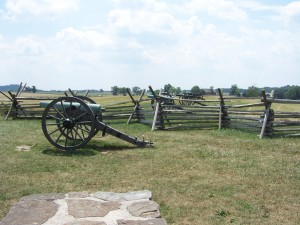by Steve DiIoia
As a leader, have you ever given a project or a task to one of your team members only to find it was not completed in the timeframe you wanted? Or perhaps they hesitated to take any action at all? How did you react? Did you look at the whole picture or only consider your perspective? I believe those of us in leadership positions can learn a valuable lesson from history.
We just finished celebrating the signing of the Declaration of Independence on July 4. There is another historical event that took place on July 4: the retreat of the Southern Army off the battle field at Gettysburg. The amount of destruction is hard to fathom, with an estimated 53,000 men ending up as causalities of war. The town literally became a hospital, morgue and cemetery, as citizens tried to deal with the aftermath of battle. As the Southern Army retreated it found it was unable to cross the Potomac River. Letters and messages repeatedly came from Washington to General Meade to attack the Southern Army and finish the war. Meade never attacked and on July 14, the Southern Army finally made its way across the river back into Virginia.
Hearing this, President Lincoln said, “Great God! We had only to stretch forth our hands and they were ours…” Lincoln wrote a letter to General Meade that had some of the following comments: “I do not believe you appreciate the magnitude of the misfortune in (General) Lee’s escape…,” “As it is, the war will be prolonged indefinitely…,” “Your golden opportunity is gone…” Upon rereading what he wrote, realizing the harshness of the letter, Lincoln never sent the letter.
What good would have come from the letter if he sent it? Would it have changed the outcome? Would it have inspired General Meade or his troops? General Meade had experienced a three-day battle where he had lost some 30% of his men and the South had lost around 40% of theirs.
How would you have proceeded after winning the battle at such a cost of life? Perhaps Lincoln thought of these questions and it gave him pause—long enough to not send the letter. As commander-in-chief, perhaps he took a moment to consider the situation he did not witness and it steadied his response.
As leaders, we do not know the emotional and physical battles the people we lead have just gone through. Perhaps we can learn from history and stop to consider their side of the situation before we send the email, text or walk into their office to have a talk.
Steve is a SixSigma Master Black Belt, having trained at Motorola where Six Sigma was invented. He has over 17 years experience leading project teams in continuous process improvement, lean manufacturing and quality management systems in manufacturing companies. Steve holds numerous certifications, including coach from the Gestalt Institute, Professional Business Advisor from MEPU, and Quality Technician from the American Society of Quality. http://www.insyte-consulting.com/meet-insyte

